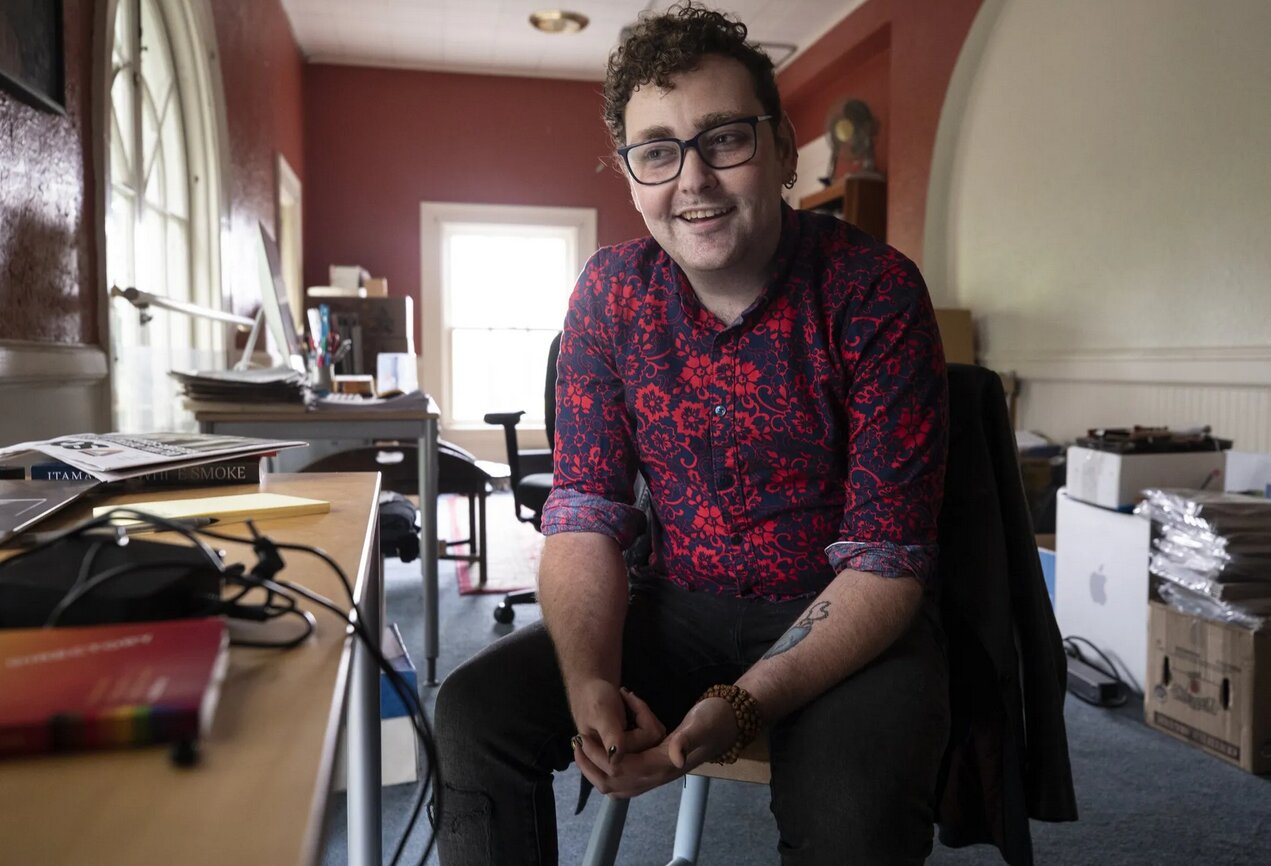
The timing could be better, with Seattle celebrating Pride Month and a vicious new culture war targeting transgender people.
But the Seattle Gay News, a crusading weekly newspaper, is losing its leader and heading for closure at year end.
That is, unless a new owner is found to carry on nearly 50 years of newspapering and advocacy by a publication launched amid the post-Stonewall push for gay rights in the early 1970s.
You can’t fault the current publisher, Angela Cragin, for wanting to move on.

Cragin inherited the paper unexpectedly when her father, legendary Capitol Hill activist and publisher George Bakan, died in 2020.
For Cragin, a mother of three living in Tri-Cities, it was as if Bakan left her a half-sunk old boat.
Three years later, after righting the ship, Cragin is ready to resume her regular life and looking for someone to buy the paper. But if nobody steps forward by December she plans to shut it down.
“I considered myself the bridge. I was able to save it,” she said. “But now it belongs in the hand of somebody who aligns with the mission.”
This predicament is all too common.
Thousands of community newspapers have struggled with transitions from one generation of owners to the next, and to new business models as the industry is disrupted by technology and changing habits. A fourth of America’s local papers failed over the last two decades and two a week fail on average, according to research done at Northwestern University’s Medill School.
“Gay media just like a lot of community media have been going through struggles over the last few years. Almost all of the legacy gay media has done some kind of transformation to survive or has folded,” said Tracy Baim, owner of Chicago LGBTQ newspaper Windy City Times.
Baim, also former publisher of the Chicago Reader, edited the 2012 book, “Gay Press, Gay Power: The Growth of LGBT Community Newspapers in America.”
Baim said most gay papers are free in print and online, supported predominantly by advertising. Now, “there needs to be additional transformation” with more audience support.
That could be a subscription-based model, like daily papers use now that tech giants are taking most advertising dollars.
Philanthropic support is another opportunity, Baim said, including a wave of new charitable support for news that’s expected this year.
Whether such papers should become nonprofit, as Cragin has considered, is an open question.
Baim made such a conversion at the Chicago Reader but said she doesn’t believe it’s the right model for most publications in niche markets, like the gay press, the Black press and Latino press.
With the Black press, for instance, Baim said there are lots of discussions about building generational wealth and handing down assets. Taking that away by making papers nonprofit may not be the right approach for most of them.
It’s also important for publications to avoid having a single-point of failure, Baim said, whether that’s a for-profit funded primarily by ads or a nonprofit dependent on philanthropy.
“It would be a great loss to lose the Seattle Gay News,” Baim said. “It’s a tremendous legacy paper in the Northwest. … I’m hoping it does survive.”
Although the paper was an early, treasured signpost for the region’s gay community and played an especially important role during the AIDS crisis and fight for marriage equality, its business struggled as much or more than the overall news industry.
Even before print media began tumbling in the 2000s, Seattle Gay News faced new competition from The Stranger, another weekly centered on Capitol Hill.
While Bakan was a fearless and influential advocate, managing a newspaper through an evolving market wasn’t his strong suit. At his funeral, jokes were told of floated checks and other maneuvers to get the paper out, recalled state Sen. Jamie Pedersen.
Pedersen said the paper “played a super important role” covering news that didn’t get covered elsewhere.
“It was everywhere so that if you went into bars or other community places you could find out what was going on in the community,” he said. “That was important for a connection tool, to help create community.”
Still, the paper struggled. Amid the pandemic, it was printing just 1,000 copies a week and $100,000 in debt.
Cragin, who had no publishing experience and a complicated relationship with her father, wasn’t sure what to do.
But she was motivated to save it by the outpouring of appreciation for Bakan and what the paper had done for people.
“This is something I learned to care for, because it was a process to learn the value of this little paper,” she said. “I did not have that when I first came on the scene. The community convinced me, through how they viewed it and through my father, that it was worth saving.”
The burden was overwhelming at first.
“It was just unexpected, it was the middle of COVID, I’m his only child and everything was on me … everything was messy, everything was difficult,” she said.
Still, Cragin and the paper’s team turned it around.
Cragin hired a new editor, A.V. Eichenbaum, and they upgraded the website, increased circulation and added new contributors to broaden the paper’s appeal. It was rebranded as SGN and emphasizes that it’s for the broader LGBTQIA+ community.
A GoFundMe campaign raised $19,000. That was short of its $30,000 goal but enough to turn the corner. Business growth since enabled Cragin to clear SGN’s debt and stabilize it.
Eichenbaum said the staff includes three or four people working full-time hours, all as freelancers. It’s publishing 2,000 copies a week and its website gets around 50,000 monthly visitors, though it hit 108,000 in January.
“I feel as though we’ve nursed a neglected garden back to life,” Eichenbaum said in a recent email.
But Eichenbaum plans to leave the paper at the end of July, partly because of the uncertainty.
“I don’t know what I’m going to do next but sometimes you need to take a leap of faith,” they said.
Cragin summed it up, channeling her late father’s assertiveness:
“Seattle convinced me to do this,” she said. “OK, Seattle, put your money where your mouth is.”